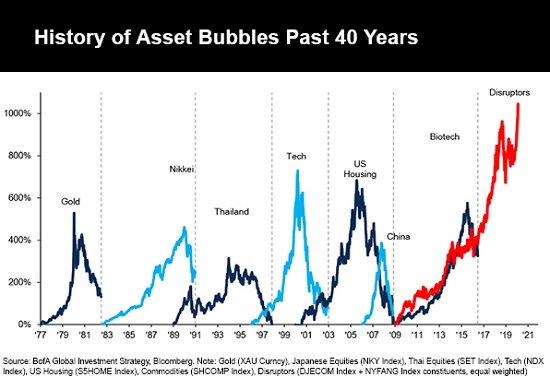Hapless bagholders have two options: buy the dip and be destroyed, or hang on hoping for a reversal and be destroyed.
One often overlooked characteristic of the current stock market bubble is the extremely small exit for sellers trying to avoid becoming hapless bagholders. Bubbles always present small exits because once sentiment turns, buyers vanish and so price goes over the waterfall and crashes on the rocks below (accompanied by the screams of all the punters who reckoned they'd exit at the top).
But modern markets have characteristics which have diminished the exit to a tiny hole in the wall. These include:
1. The dominance of index funds. When shares of the index are sold, every constituent stock gets sold. This triggers cascades of selling that overwhelm "buy the dip" buying.
2. Computers do most of the trading, and the algorithms are set to follow trends with extreme ferocity. Once the trend is "sell," the program selling will self-reinforce the cascade.
3. Central banks have generated a mesmerizing moral-hazard propaganda field that implicitly suggests "we'll never stocks go down again, ever!" Yet the only way central banks can causally intervene is to buy stocks directly in size, i.e. in the trillions of dollars. (Recall U.S. stocks are around $35 trillion, global stock markets about $85 trillion. Yes, buying futures contracts through proxies works in stable markets, but not so much in panic cascades of selling.)
Beneath the illusory stability, modern markets are extremely illiquid, meaning that when the bubble pops and punters/money managers try to sell, there are no buyers at any price.
Liquidity in a crash depends on "buy the dip" bagholders. Once they've been destroyed, there are no more buyers at any price. The "buy the dip" crowd will be wiped out after the first spike higher fails, and then nobody will be left who's willing to catch the falling knife.
It's illuminating to go back to to former Federal Reserve chairman Alan Greenspan's 2014 belated bleatings in
Foreign Affairs,
Why I Didn't See the Crisis Coming. Greenspan presented one primary reason: the Fed's models failed to accurately account for "tail risk," (otherwise known as
things that supposedly happen only rarely but when they do happen, they're a doozy), because guess what--they happen more often than statistical models predict.
"Tail risk" is a fancy way of saying that bagholders willing to buy the dip and be destroyed as the crash gathers momentum are too scarce to stop the waterfall of selling. That leaves everyone with a long position in stocks with a binary choice: either grasp the fleeting advantage of selling out in the first wave of selling--and by the way, there's no advantage unless every single share is sold--or become a hapless bagholder.
Hapless bagholders have two options: buy the dip and be destroyed, or hang on hoping for a reversal and be destroyed. Bubbles always burst, and the confidence that "this isn't a bubble" and "the Fed has our back" are counter-indicators of just how crushing the pop will be: the greater the confidence/euphoria, the greater the crash.
All those drunk on "the Fed has our back" punch might want to ponder the Fed's balance sheet: nine weeks of going nowhere:
12/25/19 $4.165 trillion
1/1/20 $4.173 trillion
1/8/20 $4.149 trillion
1/15/20 $4.175 trillion
1/22/20 $4.145 trillion
1/29/20 $4.151 trillion
2/5/20 $4.166 trillion
2/12/20 $4.182 trillion
2/19/20 $4.171 trillion
Sober up, people. All bubbles pop, and the higher the extreme, the greater the crash. Only the first sellers will escape; everyone who hesitates or "buys the dip" will be crushed at the bottom of the waterfall.
NOTE: Contributions/subscriptions are acknowledged in the order received. Your name and email remain confidential and will not be given to any other individual, company or agency.
Thank you, Michael M. ($60), for your monstrously generous contribution to this site -- I am greatly honored by your steadfast support and readership.
| |
Thank you, Dan B. ($50), for your superbly generous contribution to this site -- I am greatly honored by your support and readership.
|




























